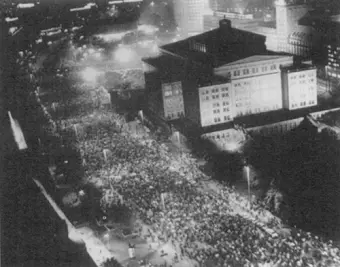Exit-Voice Dynamics and the Collapse of East Germany
The Crisis of Leninism and the Revolution of 1989
Format:Hardback
Publisher:Duke University Press
Published:10th Jul '06
Currently unavailable, and unfortunately no date known when it will be back

Develops a theory of how exit-voice dynamics affect collective action in order to identify the processes that spurred the extraordinarily swift and surprisingly bloodless 1989 revolution within the German Democratic Republic
Winner of the Social Science History Association President’s Book Award
East Germany was the first domino to fall when the Soviet bloc began to collapse in 1989. Its topple was so swift and unusual that it caught many area specialists and social scientists off guard; they failed to recognize the instability of the Communist regime, much less its fatal vulnerability to popular revolt. In this volume, Steven Pfaff identifies the central mechanisms that propelled the extraordinary and surprisingly bloodless revolution within the German Democratic Republic (GDR). By developing a theory of how exit-voice dynamics affect collective action, Pfaff illuminates the processes that spurred mass demonstrations in the GDR, led to a peaceful surrender of power by the hard-line Leninist elite, and hastened German reunification. While most social scientific explanations of collective action posit that the option for citizens to emigrate—or exit—suppresses the organized voice of collective public protest by providing a lower-cost alternative to resistance, Pfaff argues that a different dynamic unfolded in East Germany. The mass exit of many citizens provided a focal point for protesters, igniting the insurgent voice of the revolution.
Pfaff mines state and party records, police reports, samizdat, Church documents, and dissident manifestoes for his in-depth analysis not only of the genesis of local protest but also of the broader patterns of exit and voice across the entire GDR. Throughout his inquiry, Pfaff compares the East German rebellion with events occurring during the same period in other communist states, particularly Czechoslovakia, China, Poland, and Hungary. He suggests that a trigger from outside the political system—such as exit—is necessary to initiate popular mobilization against regimes with tightly centralized power and coercive surveillance.
“Exit-Voice Dynamics and the Collapse of East Germany is a highly original contribution to the study of Communism’s collapse and the role of collective action in political change. Its mixture of quantitative and qualitative evidence is unprecedented.”—Jeffrey Kopstein, author of The Politics of Economic Decline in East Germany, 1945–1989
“Steven Pfaff offers a bold sociological explanation of the collapse of Communism in East Germany. On the basis of detailed protest data, he explores the dynamics of ‘exit’ and ‘voice’ in eroding popular ‘loyalty’ to the Marxist dictatorship.”—Konrad H. Jarausch, editor of Dictatorship as Experience: Towards a Socio-Cultural History of the GDR
“With a simple yet incisive theoretical perspective, Steven Pfaff casts a bright light on the crisis of East German Communism, the ‘exiting crisis’ and popular rebellion of 1989, the marginalization of leftist activists, and the turn to nationalism and German reunification. This is the best theoretical analysis of the East German revolution that I have read. Pfaff’s model of exit-voice dynamics is also a major contribution to the literature on collective action and revolutions.”—Jeff Goodwin, author of No Other Way Out: States and Revolutionary Movements, 1945–1991
“[T]his is a fine study that breaks new empirical and theoretical grounds in political science. It shines illuminating light on the continuing problem of racial inequality. In a sharp manner, it raises the thorny question of whether political equality is possible without economic parity. This book shows that rhetorical tricks claiming colorblindness dry up like a raisin in the sun when confronted with historical and structural realities.” -- Jamie K. McCallum * Mobilization *
“This is an excellent study is several respects: it provides a very rich and vivid account of the German revolution. It sometimes reads like a suspenseful thriller. The mixture of statistical analysis and narrative evidence from a great variety of sources . . . is rarely found in literature. . . . My recommendation is: if you want to read a fascinating narrative of a unique revolution with a sound empirical and theoretical underpinning, then Steven Pfaff’s book is a ‘must’.” -- Karl-Dieter Opp * Social Forces *
ISBN: 9780822337522
Dimensions: unknown
Weight: 612g
352 pages